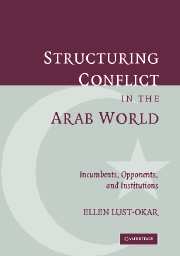Book contents
- Frontmatter
- Contents
- List of Figures and Tables
- Acknowledgments
- A Note on the Use of Language
- Abbreviations
- Introduction
- 1 The Manipulation of Political Opposition
- 2 Structures of Contestation
- 3 Playing by the Rules: The Inclusion and Exclusion of Political Oppositions
- 4 Dynamics of Opposition in Unified SoCs
- 5 Opposition Dynamics in Divided SoCs
- 6 Formal SoCs and Informal Political Manipulation
- Conclusion
- Appendix: Political Forces in Egypt, Jordan and Morocco
- Notes
- Bibliography
- Index
2 - Structures of Contestation
Published online by Cambridge University Press: 22 September 2009
- Frontmatter
- Contents
- List of Figures and Tables
- Acknowledgments
- A Note on the Use of Language
- Abbreviations
- Introduction
- 1 The Manipulation of Political Opposition
- 2 Structures of Contestation
- 3 Playing by the Rules: The Inclusion and Exclusion of Political Oppositions
- 4 Dynamics of Opposition in Unified SoCs
- 5 Opposition Dynamics in Divided SoCs
- 6 Formal SoCs and Informal Political Manipulation
- Conclusion
- Appendix: Political Forces in Egypt, Jordan and Morocco
- Notes
- Bibliography
- Index
Summary
Most would agree that authoritarian elites attempt to manage and manipulate their political opponents. They decide whom to appease with ministerial portfolios and whom to throw into prison. In addition to using such sticks and carrots, ruling elites manipulate the opposition through SoCs. Through the establishment of institutions and the selective implementation of policies, they allow some groups to participate in the political system while excluding others. Although this has generally received only passing attention, these SoCs have critical implications for the relationships between state and opposition elites, particularly during prolonged economic crises. SoCs shape relations among different opposition groups, as well as between these groups and the government. In doing so, they help determine when and if opponents challenge governing elites.
Yet, is there a systematic, theoretically coherent way to understand the intrigues of state and opposition elites? Can the potential for incumbents to respond with payoffs or imprisonment, or for opposition elites to compete or cooperate, be defined? This chapter argues that it can be. It focuses on how incumbents create different institutional arrangements through which they influence opposition elites' choices to form coalitions and press for political change. These arrangements vary significantly according to where incumbents draw the line between legal and illegal opposition groups. This chapter will set forth a framework within which to consider government–opposition relations. It will then examine the changing strategies in Jordan, Morocco, and Egypt.
- Type
- Chapter
- Information
- Structuring Conflict in the Arab WorldIncumbents, Opponents, and Institutions, pp. 36 - 67Publisher: Cambridge University PressPrint publication year: 2005



